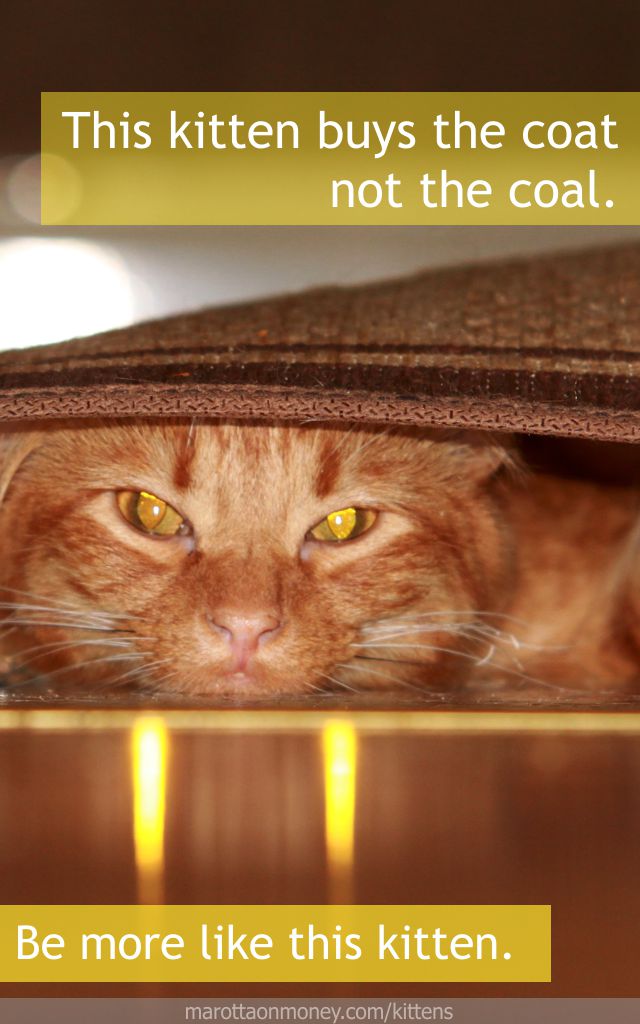 Kittenomics #24
Kittenomics #24
In A Christmas Carol, Ebeneezer Scrooge, although lacking generosity, is a savvy financial man. In the 1984 movie, he says to his employee Bob Cratchit:
Garments were invented by the human race as a protection against the cold. Once purchased, they may be used indefinitely for the purpose for which they are intended. Coal burns. Coal is momentary and coal is costly. There will be no more coal burned in this office today…
Although Scrooge’s use of this wise proverb may not be commendable, the proverb itself is very valuable. “Buy the coat not the coal” can save you from many bad purchases. “Coal,” unnecessary consumable goods, is hiding in a lot of our culture. It takes wisdom, discernment, and intentionality to see what the wiser purchases of “coats” should be.
This kitten sees “coal” hiding in enticing sales and avoids going bankrupt saving money.
What “coal” do you avoid?
Read all the Kittenomics here!
To read more about this topic check out What was Wrong with Tiny Tim?
Photo of Mala taken by Dan Zen and used here under Flickr Creative Commons.
← Previous |
Next → |
2 Responses
Craig Kingston
I can see the point about buying a coat to avoid the need for coal which burns up and is gone within a short period of time. Can you give us some more examples of this concept? Maybe avoid going out to eat because this is a big waste of money and instead eat at home which saves money. Not quite the same, but the savings part is similar. It’s always a good idea to save money and plan ahead to build wealth. Too few of us take this view and instead build up huge credit card debt which can be like a lead weight holding us back for years.
Megan Russell
I imagine that which consumables are unnecessary may vary from family to family. There’s nothing wrong with buying something you can only use once. Toilet paper is a good example of a consumable for which I imagine most of us wouldn’t want to find a substitute. Throwing it away is a feature.
However, here are some potential “coal” that does come to my mind:
Paper towels seem like the ultimate example of this for me since every mess or spill — be it water or pasta sauce — seems like it requires a paper towel to clean up. A longer lasting “coat” for this would be washable towels or sponges.
Another example is disposable mopping pads, since you have to use a new one every time you clean the floor, which, if you’re diligent, could be every week. If you like the cleaning system but want to find a longer lasting equivalent, Microfiber cloths do the trick and can be snapped on the end of those mopping systems. On the other hand, if you’re up for a change, the old mop and bucket still do the job nicely.
Wrapping paper is another purchase we normally only get to use once. My mom solved this problem by sewing cloth gift bags that tied closed. We used those for all of our family presents and then saved any paper gift bags and tissue paper we are given to use to wrap presents for others. My dad occasionally wrapped presents in the comics section of the newspaper, which was a welcome extra present for my brother and me.
Another example can be in how we use our electricity. Turning on the overhead light can be replaced by opening up the curtains to let the natural sunlight in. Turning on the air conditioning can be replaced by opening the windows to let the Spring breeze in.
Printer paper is another consumable. Tablets, e-readers, and laptops can lessen the amount of paper we need. Also, if the feature is available, you can make the default on your photocopiers and printers to print on both sides.
All that being said, for some people, time is more precious than money. At an hourly wage of $100 per hour, like some lawyers or psychologists get, spending your time doing an extra load of laundry or sewing cloth wrappings, if its at the expense of earning your wage, might not actually save you money.
For me though as a 9-5 worker, it’s worth the substitution.